Compact Unit
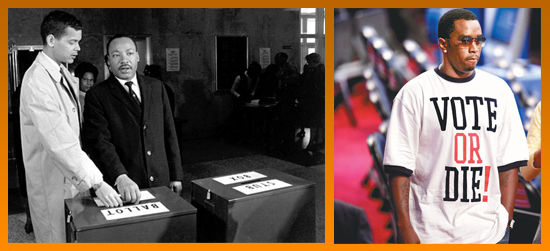
POLITICAL ACTION DAY
Sunday, November 4, 2012
Guest Writer for This Unit: Brad R. Braxton is Lois Craddock Perkins Professor of Homiletics at Southern Methodist University’s Perkins School of Theology in Dallas, TX, and senior pastor of The Open Church in Baltimore, MD.
The unit you are viewing, Political Action Day, is a compact unit. This means that it is not a complete commentary of the Scripture(s) selected for this day on the calendar, nor does it have a full, supporting cultural resource unit. Instead, to enliven the imagination of preachers and teachers, we have provided a sermonic outline, a worship and music outline, suggested books, and suggested articles, links, and videos. For additional information see Election Day in the archives of the Lectionary for 2008. 2012 is the second year that The African American Lectionary has posted compact units for moments on its liturgical calendar.
I. Description of the Liturgical Moment
Christians gather regularly in sanctuaries and confess with our lips that “Jesus is Lord.” If taken seriously, this confession is more than a statement of personal piety; it is also a declaration of political allegiance. To say that Jesus is Lord is to insist that the Pharaohs and Caesars of this world are not. Political Action Day invites believers to confess our devotion to God not merely with our lips but also through our lives.
The Bible warns about the emptiness of religious rituals that fail to fill the society with God’s goodness for all—and especially for the poor, the weak, and the oppressed (Amos 5:21-24; James 2:1-7). After we lift our holy hands in the sanctuary, we must be willing to use our helping hands in the streets to lift our sisters and brothers to higher ground. If we are filled with the spirit of Jesus, we should pour ourselves into making the world a better place in Jesus’ name.
Jesus presented his central theme in social and political terms. He preached and taught consistently about the “kingdom of God”—God’s beloved community where social differences no longer divide and access to God’s abundance is equal. Jesus’ message possessed so much potential to revolutionize the social world that the reigning political powers of his day executed him.
Jesus died for restorative justice. God raised Jesus from the dead for restorative justice. The resurrection serves notice that injustice—and the oppression and death it brings—will never have the last word. As followers of Christ, we should cast our votes in elections, protest against violent gangs on Main Street and violent greed on Wall Street, and urge nations to give up nuclear arms so that we can unite our arms as sisters and brothers. When we engage in spiritually courageous and socially conscious actions, we become living advertisements of God’s forthcoming “government.” The commercial for God’s political campaign of righteousness and reconciliation begins with these politically potent words: “Repent for the kingdom of God is at hand!”
II. Political Action Day: Sermonic Outline
A. Sermonic Focus Text: 2 Samuel 23:2-4 (New Revised Standard Version)
(v. 2) The spirit of the Lord speaks through me, his word is upon my tongue. (v. 3) The God of Israel has spoken, the Rock of Israel has said to me: One who rules over people justly, ruling in the fear of God, (v. 4) is like the light of morning, like the sun rising on a cloudless morning, gleaming from the rain on the grassy land.
B. Possible Titlesi. The Supreme Court
ii. The Oath of Office
iii. Here Comes the JudgeC. Point of Exegetical Inquiry
In both politics and biblical interpretation, context is crucial. For example, wise political candidates read local newspapers to ensure that their campaign speeches reflect the concerns of the community. Similarly, wise biblical interpreters should read the wider “news” of 1–2 Samuel to ensure that they understand the broader concerns of these biblical books. Even a quick reading of 1 Samuel 16–2 Samuel 24 will provide preachers and teachers with important narrative details about the peaks and valleys that King David experienced during his colorful and controversial life. Also, while today’s lectionary text is 2 Samuel 23:2-4, interpreters should examine 2 Samuel 23:1-7 for a fuller context.
In 2 Samuel 23:2-4, King David should be applauded for saying the “right” things about “justice” and the “fear of God.” However, a larger investigation of David’s life reveals the gap between his words and his walk. A question worth pondering is this: How might individuals not as powerful as the king—persons like Bathsheba and her murdered husband, Uriah (2 Samuel 11)—have heard David’s words in 2 Samuel 23:2-4? Interpreters of this passage should remember that “justice” often means one thing if you are a “mover and a shaker” and quite another if you lack political clout or economic capital. God’s justice, a central feature of this text, is especially concerned with how those who are “down and out” can be lifted from their dismal despair into the bright morning prophesied by this text (v. 4).
III. Introduction
My eighth grade civics teachers regularly reminded us of the three distinct, but related, branches of the United States government—the Executive branch led by the President; the Legislative branch led by the Congress; and the Judicial branch led by the Supreme Court. Each branch has its own duties, and those duties provide “checks and balances” to ensure that the other branches function within the proper limits of their power. The Judicial branch is the most fascinating in my opinion.
The leaders of the Executive and Legislative branches have terms limits. An individual can only serve as the President, a Senator, or a Congressperson for so long before that person has to submit again to the electoral process. However, when a person is appointed to the Supreme Court, she or he sits on the high court for life. Across US history, a Supreme Court Justice typically has served longer than a Commander in Chief. This might explain the custom of Supreme Court Justices administering the oath of office to the President of the United States.
The most recent administering of the oath of office was both historic and humorous. On January 20, 2009, with throngs of people on the Washington Mall and millions watching on TV and online, Chief Justice John Roberts gave the oath of office to President Barack Obama, the first African American President in US History. In the heat of the moment on that cold winter morning, the Chief Justice incorrectly recited a part of the oath. The President, being a constitutional lawyer, tried to help the Chief Justice, but in the final analysis the administering of the oath was neither elegant nor accurate. Consequently, the Chief Justice privately administered the oath to the President the next day at the White House.
The power that the earthly Chief Justice possessed did not prevent him from making a mistake. Chief Justices make mistakes. Commanders in Chief make mistakes. Chief Executive Officers make mistakes. The “ballers and shot-callers” who pull the levers of power with their hands still have feet of clay. Thus, while we respect those who lead us politically, as Christians we remind all political leaders that they, too, will come before the cosmic Chief Justice who reigns over the heavenly high court. The ultimate Chief Justice goes by many names: El Shaddai; El Elyon; the Ancient of Days. One day, all flesh—whether we are the head of state at the White House or the head of the family in our house—must give an account of our actions before the celestial Supreme Court.
IV. Moves/Points
Move/Point One – God’s justice seeks restoration, not revenge; fairness, not favoritism; life, not death.
a. Many models of “justice” in our world are based on revenge, favoritism, and death. On the one hand, our justice system often locks people in prison, even when there is reasonable doubt about their guilt. On the other hand, this same system grants “get-out-of-jail-free cards” to the well-to-do and well-connected. It sometimes seems that the bigger your paycheck is, the larger your chance for pardon and parole.
b. There is no favoritism in God’s Supreme Court. Presidents and paupers all must give an account before God. The NRSV’s translation of 2 Samuel 23:1 is perhaps misleading. The NRSV refers to David as the “favorite” of the “Strong One of Israel.” More accurately the Hebrew identifies David as the “sweetness of Israel’s song.” In other words, David is beloved by God not because David is “better” than anybody else. David is beloved by God when he sings songs that attest to God’s power. Instead of singing narrow, nationalistic songs like “God Bless America,” truly righteous politicians humbly realize that God’s “got the whole world in His hands.”
c. God has not forgotten the unaddressed injustices and unacknowledged atrocities visited by the powerful upon the powerless. What is done in the dark eventually will come out in the light. Therefore, rather than arrogantly thumping their chests and talking about America being an “exceptional nation,” American political leaders should regularly fall on their knees and pray, “Lord, have mercy on us for the injustices that our country has perpetrated against others—from Native American reservations in the American west; to the shores of West Africa; to the poverty-stricken streets on Chicago’s south side; to the poverty-stricken rice fields in south Asia. Having received your grace and mercy, God, now grant us courage to fix what is broken and build up what is torn down.”
Move/Point Two – We need political leaders who emphasize righteous deeds, not empty creeds.
a. In a world full of serious problems, empty political rhetoric should no longer be tolerated. With the authority vested in believers by the heavenly Supreme Court, we declare to all political leaders that unfulfilled campaign promises for justice and fairness will equal unemployed politicians.
b. As the King of Israel, David said the right things, but occasionally he did not do the right things. He implied in 2 Samuel 23:5 that his administration had been one of justice. If Bathsheba or her slain husband, Uriah, were to testify before the heavenly Supreme Court, would King David be declared innocent, or would he be indicted and convicted for “crimes against humanity”?
c. Instead of worrying about how people will remember them, godly politicians focus on who has been forgotten and forsaken. In order to implement God’s justice, the theologian Letty Russell suggested that we ask this question: “Who’s missing?” Politicians who truly fear God regularly ask: Who is left out of the proposal or policy for better health care, safer schools, and more jobs?
Furthermore, in 2 Samuel 23:5, preachers and teachers should consider the prominence of first-person-singular references in David’s words (i.e., my and me). King David should have used more plural pronouns like “our” and “us.” Leaders concerned about justice seek to be less self-centered and more people-centered. The biblical scholar Obery Hendricks insists that leaders at every level must treat the people’s needs as holy. He writes, “In this sacred service, there is no allegiance to Democrat or to Republican. Rather our allegiance must be to making sure that every child has enough to eat, that old folks can live their last days with security and freedom from anxiety….Our allegiance must be to crafting policies with our neighbors in mind, to listening and contemplating the people’s challenges and needs with prayer and humility” (Hendricks, The Politics of Jesus, p. 112).
Move/Point Three – A commitment to restorative justice expands the parameters of what is possible.
a. It has been said that politics is the art of the possible. Whenever God, the heavenly Chief Justice, is on our side, even the impossible becomes possible. The midnight of fear becomes the sunrise of faith. The horizon of hope is no longer cluttered by clouds of confusion. Gracious words replace the toxic words that pollute our political environment. Green jobs reduce the toxic waste that contaminates our natural environment.
b. When we are committed to bringing forth justice, we, in the words of Sheila Schuller Coleman, can: “Believe in the morning. Believe in the God of miracles. Believe in the God who is more powerful than any disappointment, any night, any end of day. As sure as there is life on earth, morning always comes again. Indeed…morning is breaking right now…somewhere!”
V. Celebration
When politicians and those whom they serve are committed to restorative justice, the ultimate Supreme Court will overturn demonic decisions made in lower courts—decisions that have incarcerated the bright possibilities of a blessed new morning. As we cast our votes, protest and march, organize and strategize, we are not depending on Democrats, but rather on our divine Deliverer. We are not resting our hopes on Republicans, but rather upon our righteous Redeemer. Because our Redeemer lives, justice will come, and morning will break. Because our Redeemer lives, morning has broken…somewhere!
As this sermon began at a Presidential Inauguration, it, too, will conclude at a Presidential Inauguration. During his Inauguration on January 20, 1993, President Bill Clinton invited Maya Angelou, poet extraordinaire, to recite a poem. As the poet who taught us why caged birds can still sing, Angelou realized that the cosmic possibilities of morning always extend beyond the dry language of public policy. As powerful as politicians are, we still need prophetic poets to envision the higher possibilities that the heavenly High Court intends for us. Angelou rightly entitled her poem “On the Pulse of the Morning”:
For this bright morning dawning for you.
History, despite its wrenching pain,
Cannot be unlived, and if faced
With courage, need not be lived again.
Lift up your eyes upon
The day breaking for you.
Give birth again
To the dream…
Here on the pulse of this new day
You may have the grace to look up and out
And into your sister’s eyes, into
Your brother’s face, your country
And say simply
Very simply
With hope
Good morning.
Politicians may come and go, but prophetic poets must always remind us of the morning. In cities and suburbs, and on fields and farms, it is time to say, “Good morning.” Weeping may endure for the night, but joy comes in the morning. It is time to say, “Good morning.” Morning by morning, God’s mercies are brand new. It is time to say, “Good morning.”
The clouds are scattering. The fog is lifting. Look! On the horizon of hope, there is the Bright and Morning Star! That star is our blessed assurance that in a world where God lives, night cannot last forever. The morning will always come. So, in eager anticipation, let us say simply, very simply, “Good morning!”
VI. Illustrations
“A.G.”
In February 2011, former British Prime Minister Gordon Brown delivered a lecture on faith and politics at the invitation of the Archbishop of Canterbury. He told the story of Stanley Baldwin, a famous early twentieth century British Prime Minister. When revising by hand his political speeches, Prime Minister Baldwin would place the phrase “refer to A.G.” in the margins of his speeches. As a result of that phrase, his diligent cabinet members and political aides would regularly seek the counsel of the Attorney General. This occurred until “after months of the Attorney General replying that he had nothing to add, the same civil servants realized that this was Baldwin leaving a note for himself that, as he gave the speech, he should, with great regularity, invoke as inspiration and support for his argument A.G. …Almighty God.” If more politicians would insert “A.G.” (“Almighty God”) in the margins of their speeches, we might have fewer marginalized people in the streets.
http://www.archbishopofcanterbury.org/articles.php/903/faith-in-politics-lecture-by-gordon-brown
Justin Case
As a way of involving children in the service or sermon, preachers or worship leaders can set up a small roundtable in the front of the sanctuary with seven chairs at the table. During worship, six children should be invited to the table. When the children ask who the seventh chair is for, the worship leader can place on the table the name card “Justin Case.” As people of God, we always make room for “Justin Case.” Just in case we omitted someone, there is always room at God’s welcome table. Justice will come when we compassionately reserve a space for “Just in Case.”
| —Brad R. Braxton |
VII. Sounds, Sights, and Colors in This Passage
2 Samuel 23:2-4
| Sounds: | The Spirit speaking through David; the diverse voices of the people over whom politicians preside; the chirping birds who announce the arrival of the morning; |
| Sights: | God as a sturdy rock; the bright light of a clear, cloudless morning; a glorious sunrise; rain or dew on the green grass; and |
| Colors: | Beautiful blue skies; the silver rain or dew on thick blades of green grass |
VIII. Books to Assist in Preparing Sermons or Bible Studies Related to Political Action Day
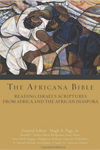 |
Burgh, Theodore W. “1–2 Samuel.” The Africana Bible: Reading Israel’s Scriptures from Africa and the African Diaspora. Hugh R. Page, Jr., ed., et. Al. Minneapolis, MN: Fortress Press, 2010, pp. 123–129. |
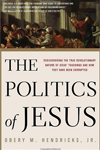 |
Hendricks, Obery, M. Jr. The Politics of Jesus: Rediscovering the True Revolutionary Nature of Jesus’ Teachings and How They Have Been Corrupted. New York, NY: Doubleday, 2006. |
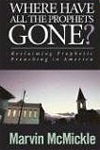 |
McMickle, Marvin. Where Have All the Prophets Gone? Reclaiming Prophetic Preaching in America. Cleveland, OH: Pilgrim Press, 2006. |
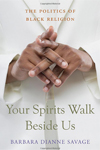 |
Savage, Barbara D. Your Spirits Walk Beside Us: The Politics of Black Religion. Cambridge, MA: Belknap Press, 2008. |
 |
Boesak, Allan. Running with Horses: Reflections of an Accidental Politician. Cape Town, South Africa: Joho Publishers, 2009. |
 |
Russell, Letty M. Just Hospitality: God’s Welcome in a World of Difference. Louisville, KY: Westminster John Knox Press, 2009. |
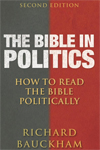 |
Bauckham, Richard. The Bible in Politics: How to Read the Bible Politically (second edition). Louisville, KY: Westminster John Knox Press, 2011. |



